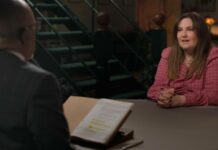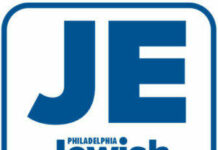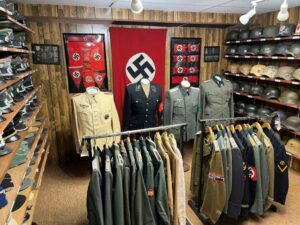
(Photo by Jarrad Saffren)
It’s the first thing you see when you walk into the small square room in the basement of this Jenkintown home. It stares right back at you from a wooden wall.
It’s a blood-red flag emblazoned with the Nazi swastika.
To its right is a frame with swastika patches inside. To its left are more of the same. Standing in front of the flag, almost at attention, are uniforms with that blood-red patch on the elbow.
Then to the left and right of those, adorning the walls, are shelves of helmets with the same logo up top. “Waffen Schutzstaffel Concentration Camp Officer,” reads the label under one. “Luftwaffe General Officer,” reads another.
It’s the 85th anniversary of Kristallnacht this day, the Nazi pogrom against Jewish homes, businesses and synagogues. The Jewish woman who owns this home, Lorna Tabby, is aware of that. So is her Jewish son, David Tabby, who is also here this November Thursday.
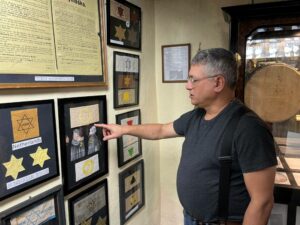
The mother and son have maintained the collection of Holocaust artifacts in Lorna’s basement because it belonged to their husband/father, Gilbert Tabby. Tabby was born in Philadelphia, grew up to become a doctor and raise a family and died here, too, in 2019.
He tried to enlist in the Army for the Korean War but was denied, according to Lorna.
Collecting was his hobby. Boxes with historical artifacts were always showing up at the house. Gilbert liked to “have his hands on things,” said his wife. By the end of his life, he got his hands on 154 letters from concentration camp prisoners, 90 stars and armbands and 11 uniforms, among many other items.
David displays the Nazi flag in his mother’s basement because it’s a reminder that the Nazis were defeated.
“It’s like, ‘We won, you lost and I have your stuff,’” the son said.
Lorna Tabby does not avoid the collection. She goes down the stairs to the basement whenever her knees permit. She says it makes her feel close again to her late husband of 65 years.
The wife never asked why he had so many boxes and so much stuff. She just told her friends that he liked to do it.
“It was a piece of history, and he wanted to preserve it,” Lorna Tabby said.
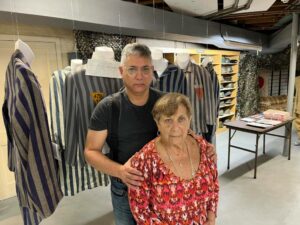
It’s a collection that extends well beyond that “Nazi room,” as David calls it. In the main room in the basement, the son has organized the uniforms on manikins. He has framed yellow “Jude” stars on the walls. He has also framed yellow forms identifying Jewish doctors and blue and white patches marking Jewish police officers in the Nazi ghettos.
David Tabby tried reaching out to the U.S. Holocaust Memorial Museum in Washington, D.C., and Yad Vashem, the Holocaust remembrance center in Israel, for help in identifying the items. He never got a response.
“I thought the world would be busting the door down to want to see it,” the son said.
Leaders at one local synagogue, Har Zion Temple in Penn Valley, agreed to display the items for two weeks in October. Har Zion’s cantor, Randy Herman, was struck by the soles of shoes made with Torah-scroll parchment.
“I was like, this isn’t just a genocidal tendency. It suggests to me something sadistic and kind of psychotic,” he said. “There’s a desire in the most profound and fundamental way possible to humiliate a people and discredit a people.”
The exhibit was planned before the Oct. 7 Hamas attack on Israel, but it was appropriate nonetheless, according to Herman.
“There’s this psychotic and sadistic evil deep within humanity that erupts sometimes, and it seems to always be directed at us,” he said.
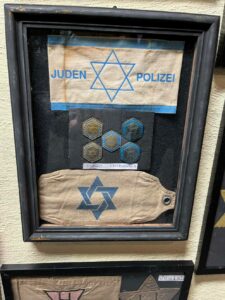
(Photo by Jarrad Saffren)
Lorna Tabby’s synagogue, Old York Road-Temple Beth Am in Abington, will display the items on Yom HaShoah in 2024. But synagogue exhibits are not enough, according to Lorna Tabby.
The mother and son may reach out to the Weitzman National Museum of American Jewish History in Philadelphia to see if its leaders are interested. Even if they are not, the family will not stop trying to figure out what to do next. The collection may just be passed down to Tabby’s descendants.
Either way, it will be passed down.
“If it were going to any kind of museum, I’d want his collection to stay together,” David Tabby said.




